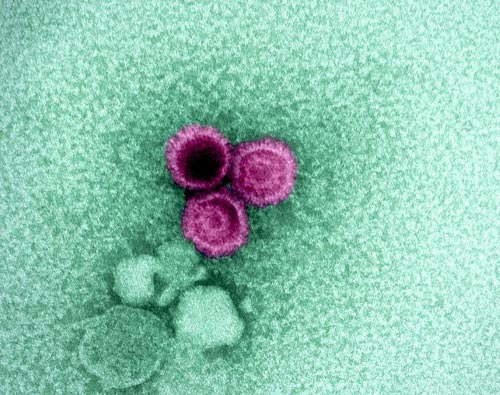New details of EBV protein could aid treatment, prevention efforts.
March 14, 2024 - Studies of interactions between two lab-generated monoclonal antibodies (mAbs) and an essential Epstein-Barr virus (EBV) protein have uncovered targets that could be exploited in designing treatments and vaccines for this extremely common virus. The research was led by Jeffrey I. Cohen, M.D., and colleagues from the National Institute of Allergy and Infectious Diseases (NIAID), part of the National Institutes of Health. Study findings were published in the journal Immunity.
Approximately 95% of the world’s population is infected with EBV, which remains in the body permanently, typically in B lymphocytes, which are antibody-producing immune system cells, and cells lining the throat and pharynx. EBV can sometimes lead to B-cell cancers, including Burkitt, Hodgkin and non-Hodgkin lymphomas, or to gastric or nasopharyngeal cancers. Recently, EBV infection was shown to significantly raise the risk of developing multiple sclerosis. There is no vaccine to prevent EBV infection nor a specific treatment.

An electron micrograph showing three Epstein-Barr virus (EBV) particles colorized pink. NIAID
In this study, NIAID investigators examined a viral protein called gp42, which the virus must use to infect B cells. Theoretically, a vaccine or antibody-based treatment capable of blocking gp42’s ability to bind to or fuse with B cells would prevent EBV infection and, thus, the virus’s ability to persist in those cells. The team generated two gp42-specific mAbs, A10 and 4C12, and used X-ray crystallography to visualize how they interacted with gp42. The crystal structures revealed that the two mAbs interacted with distinct, non-overlapping sites on gp42. Monoclonal antibody A10 blocked the site on gp42 required for receptor binding, while 4C12 interfered with a different site that is involved in membrane fusion.
Next, the scientists tested A10, 4C12 and several other mAbs in mice for their ability to prevent EBV infection and EBV lymphomas. The mAb A10 provided nearly complete protection against EBV infection and none of the mice developed lymphoproliferative disease or lymphoma. In contrast, nearly all the mice treated with other mAbs became infected and some developed lymphoproliferative disease or lymphoma.
If future studies show mAb A10 to be safe and effective in humans, it could have clinical applications, particularly in people who have not been infected with EBV; those with immunodeficiency conditions, including severe combined immunodeficiency; or people receiving transplants. People with such conditions are at risk of developing severe or fatal cases of EBV disease during their initial encounter with the virus. The investigational monoclonal antibody could potentially be used prophylactically to prevent or better control EBV infections in such cases, the investigators note.
Additionally, the study team suggests that identification of the vulnerable sites on gp42 also paves the way to designing future vaccines that could elicit antibodies against one or both of the newly described sites.
Article: W Bu et al. Epstein-Barr virus gp42 antibodies reveal sites of vulnerability for receptor binding and fusion to B cells. Immunity DOI: 10.1016/j.immuni.2024.02.008 (link is external) (2024).
NIAID conducts and supports research—at NIH, throughout the United States, and worldwide—to study the causes of infectious and immune-mediated diseases, and to develop better means of preventing, diagnosing, and treating these illnesses. News releases, fact sheets and other NIAID-related materials are available on the NIAID website.
About the National Institutes of Health (NIH): NIH, the nation's medical research agency, includes 27 Institutes and Centers and is a component of the U.S. Department of Health and Human Services. NIH is the primary federal agency conducting and supporting basic, clinical, and translational medical research, and is investigating the causes, treatments, and cures for both common and rare diseases. For more information about NIH and its programs, visit www.nih.gov.
NIH…Turning Discovery Into Health®
Source & photo: NIH








